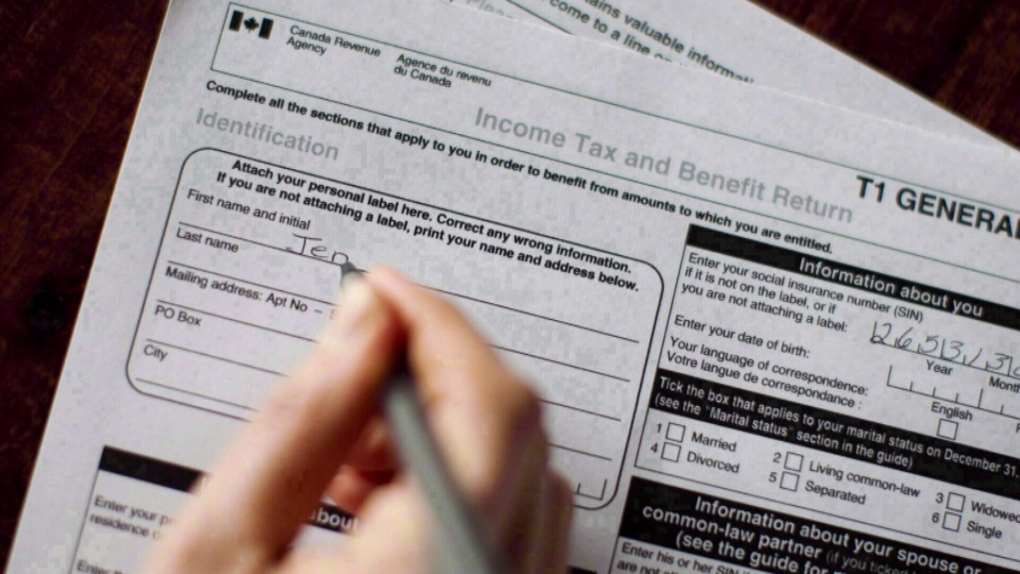Ontario income credits people need to know about before filing their taxes

While the deadline to file your taxes gets closer, there are some personal tax credits people in Ontario may qualify for.
“Today is the best time to start putting all your papers together, and that way, you’ll be sure you don’t forget anything,” H&R Block tax specialist, Yannick Lemay, told CTV News Toronto.
“Often what we see in practice is that the credits that get forgotten are those that people need to search for slips, they need to search for receipts.”
Lemay brought up Ontario’s Staycation Tax Credit as an example. Through this credit, Ontarians who have stayed in a hotel or rented a cottage in the province can claim 20 per cent of eligible accommodation expenses between Jan. 1 and Dec. 31, 2022.
“We are excluding costs for food, entertainment, gas, and all extra expenses, but anything that goes for accommodation for travel, you can claim,” he said, noting Ontarians who want to apply for this credit should have all of their receipts. “It’s up to $1,000 [for an individual], and it’s a 20 per cent rate credit, so that means Ontarians can get up to $200 back.”
Families and couples can claim up to $2,000 and get a maximum credit of $400.
“Now is the time to get those receipts,” Lemay said. “But there are other credits that have changed, improved, or are new credits, for which you don’t necessarily have to provide an additional receipt.”
Lemay pointed to the Ontario Seniors Care at Home Tax Credit, which can help low to moderate-income seniors with eligible medical expenses.
Seniors who are 70 years and older can write off up to 25 per cent of their medical expenses, and can claim up to $6,000 for a maximum of $1,500 in return.
The credit is refundable and anyone earning up to $65,000 annually can qualify, though the amount of credit is on a sliding scale based on income level.
There is also the Childcare Access and Relief from Expenses (CARE) tax credit, which helps families with a household income of $150,000 or less. Eligible families may be able to claim up to 75 per cent of child care expenses, including child care centres and camps.
While there are personal income tax credits, Lemay says there are also deductions that Ontarians will want to keep in mind.
Anyone who has moved to be closer to work or school might be able to claim their moving expenses, he said.
“Sometimes people think they don’t move far enough to be able to deduct moving expenses, but the criteria is 40 kilometres,” Lemay said.
According to the federal government, if your new home is at least 40 kilometres closer to your new job than your previous home was, you can be eligible for the moving expenses deduction.
Lemay also noted those who have investments outside of their registered accounts – like their Tax Free Savings Account (TFSA) or Registered Retirement Savings Plan (RRSP) – can deduct management fees.
“If you’re paying management fees to your financial institution to manage your money – your investments – those fees are deductible, and they don’t come with a tax slip,” Lemay said. “Sometimes you have to look at the bank statement to find the fees.”
May 1 is the deadline for most Canadians to file their tax returns, with June 15 being the deadline for those who are self-employed.
CTVNews.ca Top Stories

MPP Sarah Jama asked to leave Ontario legislature for wearing keffiyeh
MPP Sarah Jama was asked to leave the Legislative Assembly of Ontario by House Speaker Ted Arnott on Thursday for wearing a keffiyeh, a garment which has been banned at Queen’s Park.
Mountain guide dies after falling into a crevasse in Banff National Park
A man who fell into a crevasse while leading a backcountry ski group deep in the Canadian Rockies has died.
2 teens charged in Halifax homicide: police
Two teenagers have been charged with second-degree murder in connection to an alleged homicide near the Halifax Shopping Centre earlier this week.
'Deep ignorance': Calls for Manitoba trustee to resign sparked after comments about Indigenous people and reconciliation
A rural Manitoba school trustee is facing calls to resign over comments he made about Indigenous people and residential schools earlier this week.
12-year-old hippo in Japan raised as a male discovered to be a female
When Gen-chan arrived at a zoo in Japan in 2017, no one questioned whether the then-five-year-old hippopotamus was a boy. Seven years later, zoo staff made a surprising discovery: Gen-chan, now 12, was female.
Here's why Harvey Weinstein's New York rape conviction was tossed and what happens next
Here's what you need to know about why movie mogul Harvey Weinstein's rape conviction was thrown out and what happens next.
Legendary hockey broadcaster Bob Cole dies at 90: CBC
Bob Cole, a welcome voice for Canadian hockey fans for a half-century, has died at the age of 90. Cole died Wednesday night in St. John's, N.L., surrounded by his family, his daughter, Megan Cole, told the CBC.
Humanist group threatening to sue Vancouver over council prayers
The B.C. Humanist Association has threatened legal action against the City of Vancouver for allowing prayers at council, following a similar warning issued earlier this month to a smaller community on Vancouver Island.
LHSC performs a Canadian first in robot-assisted direct lateral spine surgery
Spine surgery may never be the same for people with chronic back pain and other physical ailments.































